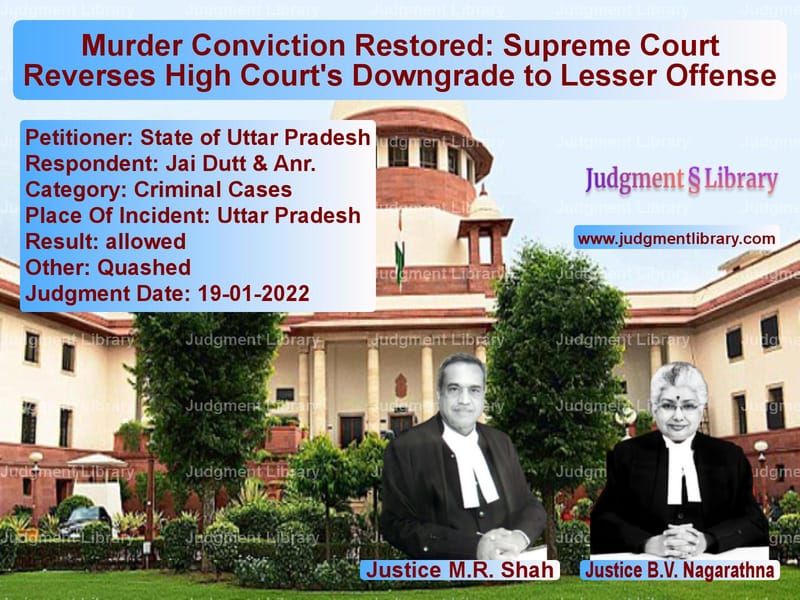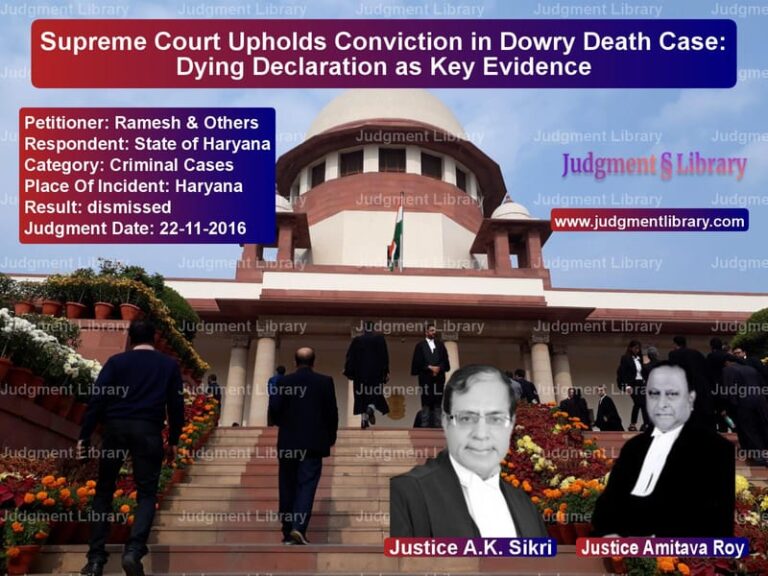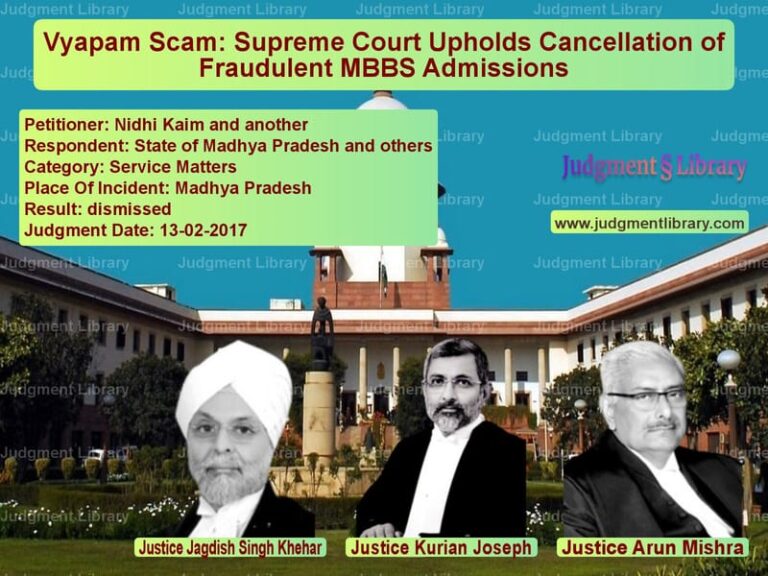Murder Conviction Restored: Supreme Court Reverses High Court’s Downgrade to Lesser Offense
The Supreme Court of India recently delivered a significant judgment in the case of State of Uttar Pradesh vs. Jai Dutt & Anr., reinstating the murder conviction of the accused after the Allahabad High Court had downgraded the offense to grievous hurt. The case revolved around the brutal assault of a man who later succumbed to his injuries, raising crucial legal questions on the classification of murder under the Indian Penal Code (IPC).
Background of the Case
The incident occurred in Uttar Pradesh, where the victim, Ram Autar, was attacked while working in his agricultural field. According to the prosecution, the accused—Jai Dutt and others—armed with weapons, assaulted the victim and inflicted multiple injuries. Due to the severity of the attack, the victim was taken to a hospital in Lucknow, where he succumbed to his injuries after six days.
The trial court convicted the main accused under Section 302 of the IPC (murder) and sentenced them to life imprisonment. However, the accused challenged this conviction in the Allahabad High Court, which modified their sentence, reducing it from Section 302 (murder) to Section 326 (grievous hurt). The High Court based its decision on the fact that the victim did not die immediately and no skull fractures were reported.
Arguments by the Prosecution
The State of Uttar Pradesh, represented by Senior Advocate Rana Mukherjee, argued that:
- The accused deliberately attacked the victim with lethal weapons, causing injuries that led to his death.
- Just because the victim died six days later does not change the nature of the offense from murder to grievous hurt.
- The High Court wrongly ignored the post-mortem report, which confirmed fatal head injuries.
- Medical evidence, including the deposition of Dr. P.R. Mishra, clearly established the cause of death as head trauma.
- The High Court had erroneously relied on the delay in death rather than the severity of injuries.
Arguments by the Defense
The defense, led by Senior Advocate Salman Khurshid, countered that:
- The absence of skull fractures indicated that the injuries were not fatal.
- The victim sustained multiple injuries but initially survived, which meant there was no intent to kill.
- The fight erupted spontaneously over a minor land dispute, indicating a lack of premeditation.
- The accused had already served a significant sentence, and reversing the High Court’s judgment would be harsh.
Supreme Court’s Observations
The Supreme Court bench, comprising Justice M.R. Shah and Justice B.V. Nagarathna, critically examined the findings of both the trial court and the High Court. The Court made the following observations:
“The post-mortem report clearly states that the deceased suffered a fatal head injury, which ultimately caused his death. The High Court erred in concluding that the delay in death altered the nature of the offense.”
“A person might die due to internal injuries, even in the absence of a visible skull fracture. The medical evidence leaves no doubt that the injuries inflicted by the accused were sufficient in the ordinary course of nature to cause death.”
The Supreme Court found the High Court’s reasoning flawed, ruling that the presence of severe head injuries and their ultimate fatality made it a case of murder.
Final Judgment
The Supreme Court allowed the State’s appeal and restored the trial court’s original conviction. The key directives were:
- The accused were found guilty under Section 302 of the IPC.
- The previous ruling under Section 326 IPC was set aside.
- The accused were sentenced to life imprisonment.
- The accused were to be taken into custody immediately to serve their sentence.
Legal Implications
This ruling reinforces several legal principles:
- Delay in death does not negate murder: If injuries inflicted are fatal in the ordinary course of nature, the crime remains murder, regardless of how long the victim survives.
- Medical evidence holds primacy: Courts must give due weight to forensic reports, which in this case clearly linked the head injury to the victim’s death.
- Judicial review of High Court decisions: The Supreme Court can overturn a High Court ruling if it finds that the interpretation of evidence was legally unsustainable.
Conclusion
The Supreme Court’s ruling in this case serves as a precedent for the proper classification of murder under Indian criminal law. By reinstating the life sentence, the Court reaffirmed that intent, weapon use, and fatal injuries determine murder, irrespective of the delay in death. This judgment strengthens the legal framework for handling similar cases in the future.
Petitioner Name: State of Uttar Pradesh.Respondent Name: Jai Dutt & Anr..Judgment By: Justice M.R. Shah, Justice B.V. Nagarathna.Place Of Incident: Uttar Pradesh.Judgment Date: 19-01-2022.
Don’t miss out on the full details! Download the complete judgment in PDF format below and gain valuable insights instantly!
Download Judgment: state-of-uttar-prade-vs-jai-dutt-&-anr.-supreme-court-of-india-judgment-dated-19-01-2022.pdf
Directly Download Judgment: Directly download this Judgment
See all petitions in Murder Cases
See all petitions in Attempt to Murder Cases
See all petitions in Judgment by Mukeshkumar Rasikbhai Shah
See all petitions in Judgment by B.V. Nagarathna
See all petitions in allowed
See all petitions in Quashed
See all petitions in supreme court of India judgments January 2022
See all petitions in 2022 judgments
See all posts in Criminal Cases Category
See all allowed petitions in Criminal Cases Category
See all Dismissed petitions in Criminal Cases Category
See all partially allowed petitions in Criminal Cases Category







